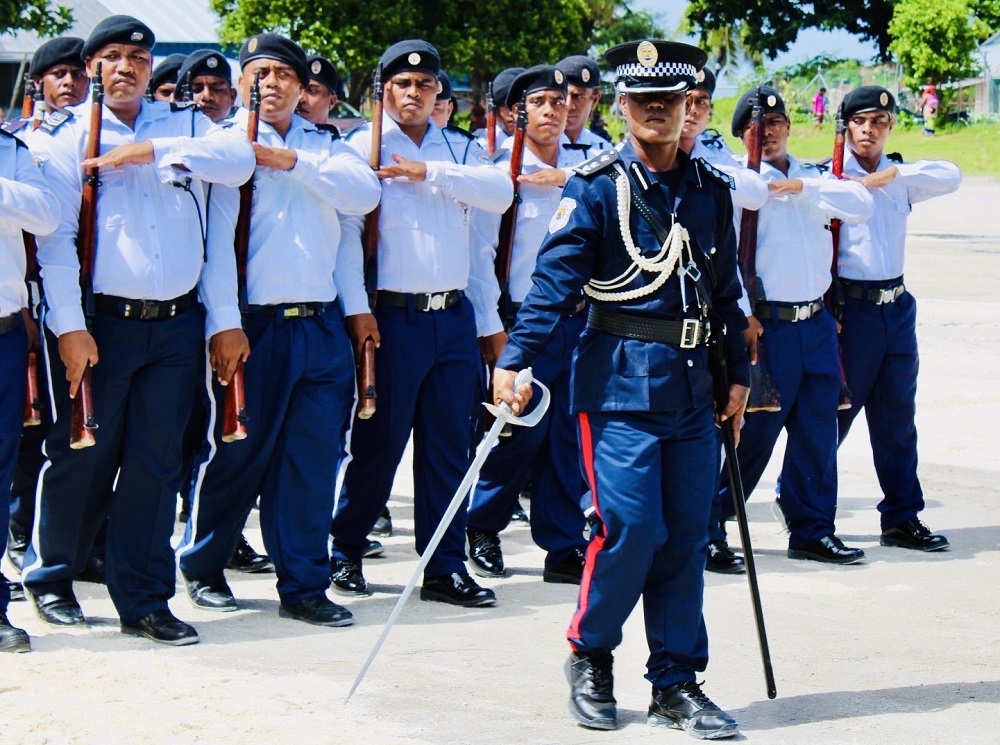
So now Chinese police are operating in Kiribati. Let’s be clear about why that’s a problem.
If Chinese police are in a country, Chinese expatriates are more easily controlled and groups favoured by China can act with greater freedom. Also, the local population can be surveilled, and the policing emphasis turns away from the community and towards protecting the leadership.
All that contrasts with policing help provided by other Pacific Island countries and Australia. There’s reason to think that Canberra wants to provide more support. It should.
Kiribati officials confirmed to Reuters last month that Chinese police in the country of 130,000 people were working in community policing and on a crime database program. Disturbingly, Kiribati had not, and still has not, announced its policing agreement with China.
Australia’s Minister for International Development and the Pacific, Pat Conroy, later told Reuters that Australia had ‘been consistent in (its) view that there is no role for China in policing, or broader security, in the Pacific.’ The US also cautioned Pacific Island countries against taking assistance from Chinese security forces.
Although there is reportedly no Chinese police station in Kiribati, the presence of police can make it easier for groups linked to the Chinese Communist Party (CCP) to conduct other activities that also undermine the country’s governance.
Chinese police have been found to work with criminal groups in foreign countries to establish informal police stations. The presence of such establishments was first reported in 2022 by the international NGO Safeguard Defenders, which focuses on transnational repression by China. It counted more than 100 of them in 53 countries.
The unofficial stations are not staffed by uniformed officers, but they work with Chinese police to seize Chinese dissidents and diaspora and take them back to China. In some cases, they persuade the targeted people to return home. China has conducted mass extraditions from Fiji and Vanuatu that have thrown doubt on those countries’ ability to uphold the law on their own territory.
Safeguard Defenders recommends that ‘all governments thoroughly investigate these “overseas police service centres” and their underpinning United Front networks’. The United Front Work Department of the CCP aims at gaining influence over individuals and organisations to promote the party’s interests.
Other security support that China has offered or given to Pacific countries provides the CCP with opportunities to collect biodata and conduct mass surveillance. Forensic laboratories, surveillance camera packages and Huawei-built data centres vulnerable to remote access all threaten to undermine the privacy and sovereignty of Pacific people and nations.
Since Kiribati has not revealed its policing deal with China, we don’t know how many of those problems it has now imported.
Australia won’t be the only country in the region to be concerned. When Solomon Islands signed a security agreement with China in 2022, the then president of the Federated States of Micronesia, David Panuelo, wrote to Solomon Islands Prime Minister Manasseh Sogavare urging him to reconsider the potential regional security effects.
There are also concerns about the differences between how China approaches policing and what the Pacific wants. For Chinese police, the priority is to protect the state and its leaders. That contrasts with the community policing approach that Australian assistance promotes.
When riots erupted in Honiara in November 2021, China’s embassy was criticised for reportedly making a failed attempt to bring in powerful weapons, including machine guns and a sniper rifle, and a 10-man security squad for protection.
Australia seems eager to provide further support to fill policing gaps in Kiribati and other Pacific island countries. There is no Australian policing presence in Kiribati but Canberra has pledged funding for a new police radio network and a police barracks. Two Australian maritime security advisers are based in the country to support the Kiribati maritime police in operating and maintaining a patrol boat that Australia donated to the country. A second patrol boat is due to arrive next year.
The US also delivers police training to Kiribati and last month had Kiribati maritime police aboard a US Coast Guard vessel for a patrol against illegal fishing. That was part of a US ship-rider program in the Pacific, under which ship personnel are exchanged between the US and partnering countries where there aren’t enough vessels or crew to patrol large maritime territories.
Australia should offer to provide additional policing support to Kiribati directly. Alternatively, the in-development Pacific Policing Initiative (PPI), supported by Australia and led by the Pacific Islands Chiefs of Police organisation, could expand its scope to invest more in developing a country’s domestic capacity and ensuring it will not be sidelined by the vision of regional operations.
The PPI is focused mainly on developing a multinational response capability for policing major events, similar to what was delivered by Australia, PNG, Fiji and New Zealand at the Pacific Games in Solomon Islands last year.
Regional training centres will also be established to support the development of the multinational response. These centres should be run in a way that boosts everyday local policing capacity for countries such as Kiribati, not drain expertise and manpower away from the streets.
Kiribati can invite Chinese police onto its territory if it wants to. If Australia wants to protest, it had better be offering comprehensive alternatives and making the security and privacy risks of Chinese engagement very clear.

